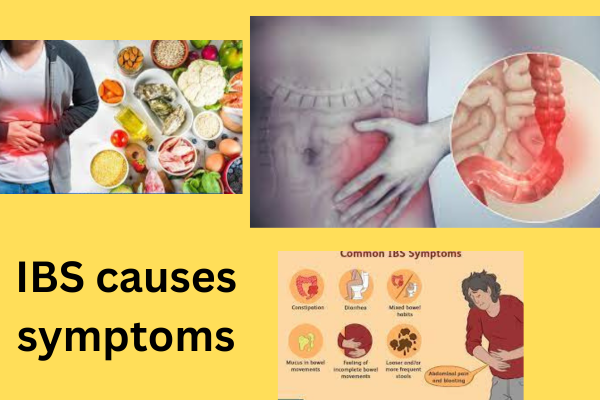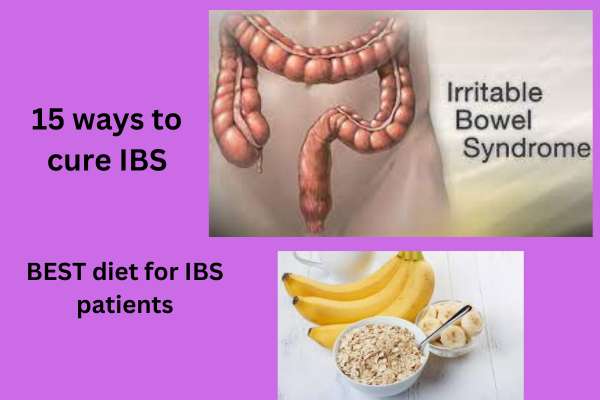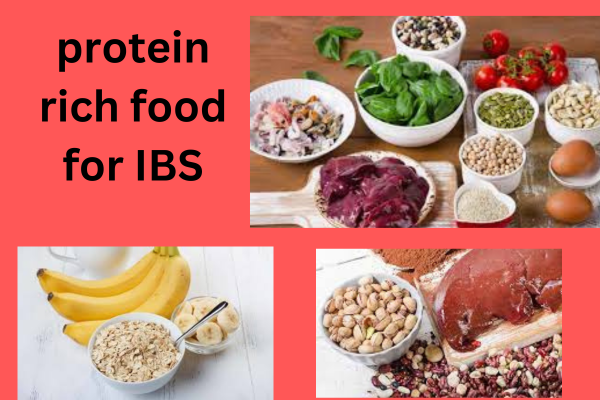
Table of Contents
ToggleIntroduction:
Irritable bowel syndrome (IBS) is a common gastrointestinal disorder that affects the large intestine (colon). It is a chronic condition characterized by a combination of symptoms, including abdominal pain, bloating, cramping, diarrhea, constipation, or fluctuations between both diarrhea and constipation. IBS can significantly affect a person’s quality of life, although it does not cause permanent digestive damage or increase the risk of serious diseases such as colon cancer.
Causes of irritable bowel syndrome (IBS).
Irritable bowel syndrome (IBS) is a complex gastrointestinal disorder characterized by a combination of symptoms, including abdominal pain, bloating, and changes in bowel habits. Although the exact cause of IBS is not fully understood, several factors are believed to contribute to its development. Here, we consider the possible causes of IBS:
Gastrointestinal Nervous System Disorders: The stomach has its own nervous system, called the enteric nervous system, which regulates digestion. Abnormalities in this system, such as increased sensitivity to stimuli or changes in communication between the brain and gut, may play a role in IBS. This hypersensitivity can lead to an exaggerated response in the normal digestive process, resulting in symptoms such as abdominal pain and discomfort.
Altered gut motility: Rhythmic contractions of muscles in the gastrointestinal tract, called gut motility, help move food and waste through the digestive system. In people with IBS, these muscle contractions can be abnormal, causing fast or slow movement of material through the intestines. This dysmotility can contribute to symptoms such as diarrhea, constipation, or fluctuations between the two.
Visceral hypersensitivity: Some people with IBS have an increased sensitivity to pain originating from internal organs, a phenomenon known as visceral hypersensitivity. Even normal contractions or bowel movements may be perceived as painful in individuals with this heightened sensitivity. This hypersensitivity can increase the sensation of discomfort and contribute to the experience of abdominal pain in IBS.
Inflammation and Immune System Dysfunction: Low-grade inflammation in the gastrointestinal tract and immune system dysfunction are implicated in some cases of IBS. Although IBS is not considered an inflammatory bowel disease like Crohn’s disease or ulcerative colitis, immune system disorders and local inflammation may contribute to symptoms in subgroups of people with IBS.
Changes in Gut Microbiota: The gut microbiota, which consists of trillions of microorganisms living in the digestive system, plays an important role in digestion, immune function and overall health. An imbalance of gut bacteria, known as dysbiosis, has been observed in people with IBS. Changes in the composition or diversity of the gut microbiota may affect gut function, immune response, and symptom severity in IBS.
Food triggers and food intolerances: Certain foods and nutrients have been implicated as triggers of IBS symptoms in sensitive individuals. Common dietary triggers include high-fat foods, spicy foods, caffeine, alcohol, and fermentable carbohydrates called FODMAPs (fermentable oligosaccharides, disaccharides, monosaccharides, and polyols). Additionally, some individuals may have specific food intolerances, such as lactose intolerance or gluten sensitivity, that exacerbate IBS symptoms.
Psychological and stress factors: Psychological factors, such as anxiety, depression, and chronic stress, can affect the onset and severity of IBS symptoms. The gut-brain axis, a bidirectional communication network between the central nervous system and the gastrointestinal tract, plays an important role in regulating gut function and stress sensitivity. Increased emotional states and stress can trigger or exacerbate IBS symptoms through changes in bowel movements, immune function, and visual perception.
Symptoms of Irritable Bowel Syndrome (IBS)
Irritable bowel syndrome (IBS) is a chronic gastrointestinal disorder with a diverse array of symptoms that can vary in severity and duration. These symptoms often change over time, and people with IBS may experience periods of remission followed by flare-ups. Below is a detailed overview of common symptoms associated with IBS.
Abdominal pain and discomfort: One of the hallmark symptoms of IBS is recurrent abdominal pain or discomfort, which can vary in intensity and location. Pain is often described as cramping or cramping and may be relieved by passing stool or gas. It can occur anywhere in the abdomen but is most often felt in the lower abdomen.
Altered bowel habits: People with IBS often experience changes in bowel habits, including:
Diarrhea (IBS-D): Some people with IBS have frequent episodes of loose or watery stools, accompanied by a feeling of urgency and incomplete evacuation.
Constipation (IBS-C): Others may experience occasional bowel movements, difficulty passing stool, or incomplete evacuation.
Mixed bowel habits (IBS-M): Some people alternate between episodes of diarrhea and constipation, experiencing both types of symptoms at different times.
Bloating and distention: Many people with IBS experience bloating, fullness, or tightness in the abdomen due to excessive gas accumulation. Abdominal distention, or visible swelling of the abdomen, may also occur, especially after eating or with a bowel movement.
Bloating (passing gas): Excessive gas production and difficulty passing gas are common symptoms in IBS. It can contribute to feelings of bloating, discomfort, and embarrassment, especially in social situations.
Mucus in the stool: Some people with IBS may notice the presence of mucus in their stool. While mucus is normally produced by the intestines to lubricate and protect digestion, increased mucus production can occur in response to inflammation or irritation in the intestines.
Urgency: People with IBS may experience a sudden and intense urge to have a bowel movement, often leading to feelings of anxiety or discomfort. This urgency can be accompanied by difficulty controlling bowel movements, especially in individuals with a predominance of diarrhea.
Fatigue and sleep disturbances: Chronic abdominal pain, discomfort, and disturbed bowel habits can cause fatigue and sleep disturbances in people with IBS. Poor sleep quality and daytime fatigue can exacerbate other symptoms and negatively impact overall quality of life.
Gastrointestinal symptoms: Some people with IBS may experience gastrointestinal symptoms, such as:
Musculoskeletal Pain: Chronic pain conditions, such as fibromyalgia, can coexist with IBS and contribute to the overall symptom burden.
Headaches: Migraines and tension headaches are more common in people with IBS than in the general population.
Urinary symptoms: Increased urinary urgency, frequency, or discomfort may accompany IBS symptoms, especially in individuals with overlapping conditions such as interstitial cystitis.
The best diet for irritable bowel syndrome (IBS).

Although there is no one-size-fits-all approach to dietary management for IBS, certain dietary changes can help reduce symptoms and improve the overall quality of life for those with the condition. Here, we take a detailed look at the best dietary strategies for managing IBS:
Low FODMAP Diet: One of the most studied and recommended dietary approaches for IBS is the low FODMAP diet. FODMAPs are fermentable carbohydrates that can be poorly absorbed in the small intestine, leading to increased gas production and osmotic effects, which can exacerbate symptoms in people with IBS. A low-FODMAP diet involves restricting high-FODMAP foods for a specified period of time, followed by systematic reintroduction to identify individual triggers. Common high FODMAP foods include certain fruits (eg, apples, pears), vegetables (eg, onions, garlic), legumes, dairy products, wheat-based products, and sweeteners (eg, sorbitol, mannitol).
Fiber-rich foods: Adequate amounts of dietary fiber are essential to promote regular bowel movements and support digestive health. However, some people with IBS may experience worsening symptoms with certain types of fiber, especially the insoluble fiber found in bran, whole grains, and some fruits and vegetables. Instead, focusing on sources of soluble fiber, such as oats, barley, psyllium husks, and certain fruits (eg, bananas, oranges) may be better and beneficial for managing symptoms in IBS.
Hydration: Maintaining adequate hydration is important to support gastrointestinal function and prevent constipation, a common symptom in people with IBS. Drinking plenty of water throughout the day, along with herbal teas and low-acid fruit juices, can help soften stools and promote regular bowel movements.
Probiotics: Probiotics are beneficial bacteria that can help restore and maintain a healthy balance of gut microbiota, which can be disrupted in people with IBS. Certain types of probiotics, such as Bifidobacterium and Lactobacillus species, have been shown to relieve IBS symptoms, particularly bloating and abdominal discomfort. Probiotic-rich foods, such as yogurt, kefir, sauerkraut, and kimchi, can be added to the diet to support gut health.
Smaller, more frequent meals: Eating smaller, more frequent meals throughout the day instead of large, heavy meals can help prevent bloating, bloating, and discomfort in people with IBS. Choosing light, easily digestible foods and avoiding overeating can help reduce gastrointestinal symptoms and promote better digestion.
Limiting trigger foods: Identifying and avoiding trigger foods that aggravate IBS symptoms is essential to effective symptom management. Common trigger foods vary from person to person but can include spicy foods, fatty foods, caffeine, alcohol, artificial sweeteners, and gas-producing foods such as beans and cruciferous vegetables. Keeping a food diary and tracking symptoms can help identify personal trigger foods and guide dietary changes.
Mindful eating and stress management: Practicing mindful eating techniques, such as chewing food slowly, eating in a relaxed environment, and paying attention to hunger and fullness cues, can help reduce IBS symptoms. . Additionally, incorporating stress management strategies, such as deep breathing exercises, meditation, yoga, and regular physical activity, can help reduce stress-related gastrointestinal symptoms and improve overall health.
Ultimately, the best diet for managing Irritable Bowel Syndrome (IBS) focuses on individualized dietary changes tailored to each person’s unique symptom profile and triggers. A combination of methods, including a low-FODMAP diet, high-fiber diet, probiotics, hydration, portion control, trigger avoidance, and stress management, can reduce symptoms, promote digestive health, and help people living with IBS. can help increase the quality of life. Consulting with a health care provider or registered dietitian experienced in managing IBS can provide personalized guidance and support for implementing dietary changes and improving symptom management.
Protein rich foods for IBS Patients:

For people with irritable bowel syndrome (IBS), adding protein-rich foods to their diet can be important for maintaining overall health and supporting digestive function. However, it is important to choose protein sources that are well tolerated and unlikely to aggravate IBS symptoms. Here are some protein-rich foods that are generally suitable for people with IBS.
Lean meats: Lean cuts of poultry, such as skinless chicken or turkey, are excellent sources of high-quality protein. They are generally well-tolerated and low in fat, which can help ease digestive discomfort in people with IBS.
Fish and seafood: Fatty fish, such as salmon, mackerel and trout, are rich in omega-3 fatty acids and provide a healthy source of protein. Additionally, seafood options such as shrimp, scallops, and cod are generally well-digested and can be included in an IBS-friendly diet.
Eggs: Eggs are a versatile and nutritious protein source that can be prepared in a variety of ways, including boiled, scrambled or poached. They are well tolerated by many individuals with IBS and provide essential amino acids for muscle repair and maintenance.
Tofu and tempeh: Tofu and tempeh are plant-based protein sources derived from soybeans. They are high in protein, low in fat, and can be easily added to a variety of dishes, such as stir-fries, salads, and soups. However, some people with IBS may need to monitor their consumption of soy products, as they may be high in fermentable carbohydrates known as FODMAPs.
Lentils and beans: Although some legumes can be high in fermentable carbohydrates and can trigger symptoms in people with IBS, small portions of well-cooked lentils, chickpeas, and peas can provide a good source of plant-based protein and fiber. are Soaking and rinsing beans before cooking can help reduce their FODMAP content and improve tolerability.
Quinoa: Quinoa is a gluten-free pseudo-grain that is rich in protein, fiber and essential nutrients. It is easy to digest and can be used as a base for salads, grain bowls or side dishes. Quinoa is considered a low FODMAP food and is generally well tolerated by people with IBS.
Greek yogurt: Greek yogurt is a creamy and protein-rich dairy product that can be included in the diet of people with IBS, especially those who tolerate lactose well. It contains probiotics, which can help support gut health, and can be enjoyed on its own or used as a base for smoothies, sauces or dips.
Nuts and seeds: Nuts and seeds, such as almonds, walnuts, chia seeds, and flaxseed, are dietary sources of protein, healthy fats, and fiber. They can be sprinkled on salads, yogurt, or oatmeal, or enjoyed as a simple snack. However, some people with IBS may need to limit their intake of high-fat nuts and seeds to avoid worsening symptoms.
When adding protein-rich foods to the diet of people with IBS, it’s important to pay attention to portion sizes and monitor how different foods affect digestive symptoms. Working with a health care provider or registered dietitian can provide personalized guidance and support to improve nutrition and effectively manage IBS symptoms.A comprehensive review of the treatment of irritable bowel syndrome (IBS).
treatment:
Although IBS cannot be cured, a variety of treatment options are aimed at reducing symptoms, improving quality of life and helping individuals manage their condition effectively. Here’s a detailed look at the treatment options available for IBS:
Lifestyle changes:
Dietary changes: Changes in dietary habits can play an important role in managing IBS symptoms. Strategies may include following a low-FODMAP diet, which includes limiting fermentable carbohydrates that can trigger symptoms, identifying and avoiding trigger foods, increasing fiber intake, and staying hydrated. .
Stress management: Stress can exacerbate IBS symptoms, so stress-reduction techniques such as relaxation exercises, mindfulness meditation, yoga, and cognitive-behavioral therapy (CBT) can be beneficial. Regular exercise and ensuring adequate sleep can also help reduce stress levels and improve overall health.
Regular exercise: Engaging in regular physical activity such as walking, jogging, swimming, or yoga can help regulate bowel function, reduce stress, and improve IBS symptoms.
Medicines:
Antispasmodics: These drugs help reduce abdominal cramps and pain by relaxing the muscles in the intestines. Examples include dicyclomine (Bentyl) and hyoscyamine (Leucin).
Anti-diarrhea: For people with diarrhea-predominant IBS, medications such as loperamide (Imodium) may be prescribed to help control diarrhea and reduce urgency.
Laxatives: In cases of significant IBS associated with constipation, osmotic laxatives, stool softeners, or fiber supplements may be recommended to relieve constipation and promote regular bowel movements.
Tricyclic Antidepressants (TCAs): Certain TCAs, such as amitriptyline or nortriptyline, may be prescribed in low doses to help relieve stomach pain and improve sleep quality in people with IBS.
Selective serotonin reuptake inhibitors (SSRIs): SSRIs, such as fluoxetine or sertraline, may be used to help manage IBS symptoms, especially in people with comorbid depression or anxiety.
Probiotics: Certain probiotic supplements containing strains of beneficial bacteria, such as Bifidobacterium and Lactobacillus species, can help balance the gut microbiota and relieve IBS symptoms, particularly bloating and abdominal discomfort.
Psychotherapy:
Cognitive Behavioral Therapy (CBT): CBT aims to identify and modify dysfunctional thoughts, beliefs, and behaviors related to IBS symptoms. It can help individuals develop coping strategies, reduce stress, and improve their overall quality of life.
Hypnotherapy: Hypnotherapy includes guided relaxation techniques and suggestive therapy to help people with IBS achieve a state of deep relaxation, reduce symptoms and improve bowel function.
Mindfulness-based stress reduction (MBSR): MBSR programs incorporate mindfulness meditation, yoga, and other mindfulness practices to help people with IBS develop present-moment awareness, reduce stress, and Help develop self-regulation skills.
Complementary and alternative therapies:
Acupuncture: Acupuncture involves inserting thin needles into specific points on the body to stimulate energy flow and promote healing. Some people with IBS may find acupuncture helpful in reducing symptoms such as abdominal pain and bloating.
Herbal remedies: Some herbal supplements, such as peppermint oil, fennel, ginger, and chamomile, may have antispasmodic and anti-inflammatory properties that can help ease IBS symptoms. However, it is important to consult a health care provider before using herbal remedies, as they may interact with medications or have side effects.
Education and Support:
Patient education: Providing people with IBS with comprehensive information about their condition, including potential triggers, dietary recommendations, and self-management strategies, empowers them to take an active role in managing their symptoms. can
Support groups: Participating in support groups or online forums for people with IBS can provide valuable emotional support, practical advice, and a sense of community for coping with the challenges of living with a chronic condition.
Finally, treatment of Irritable Bowel Syndrome (IBS) usually involves a multifaceted approach tailored to each individual’s symptoms, triggers, and needs. By combining lifestyle changes, medications, psychotherapy, complementary and alternative therapies, and education and support, people with IBS can effectively manage their symptoms, improve their quality of life, and improve their condition. Can have more control. Working with a health care provider, such as a gastroenterologist or registered dietitian, can help people with IBS.
